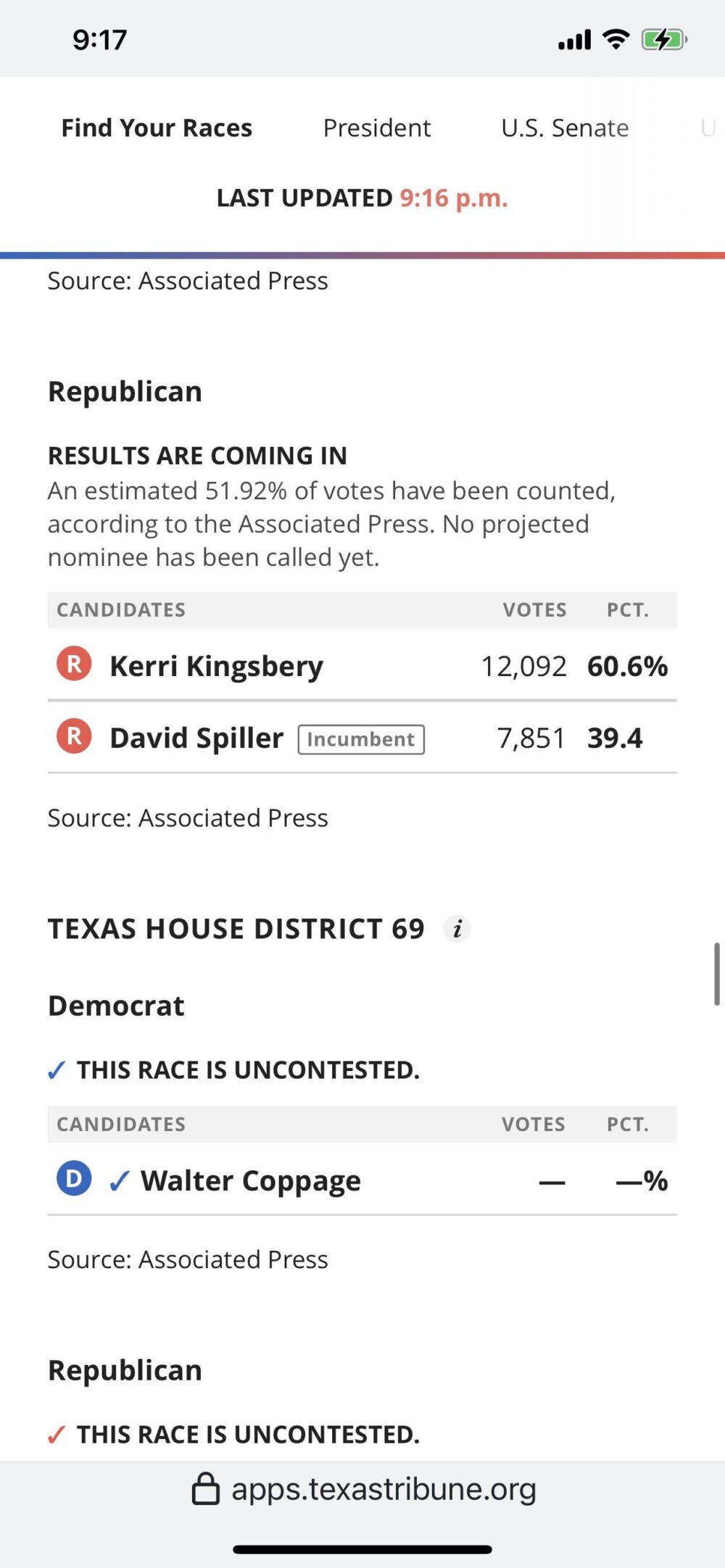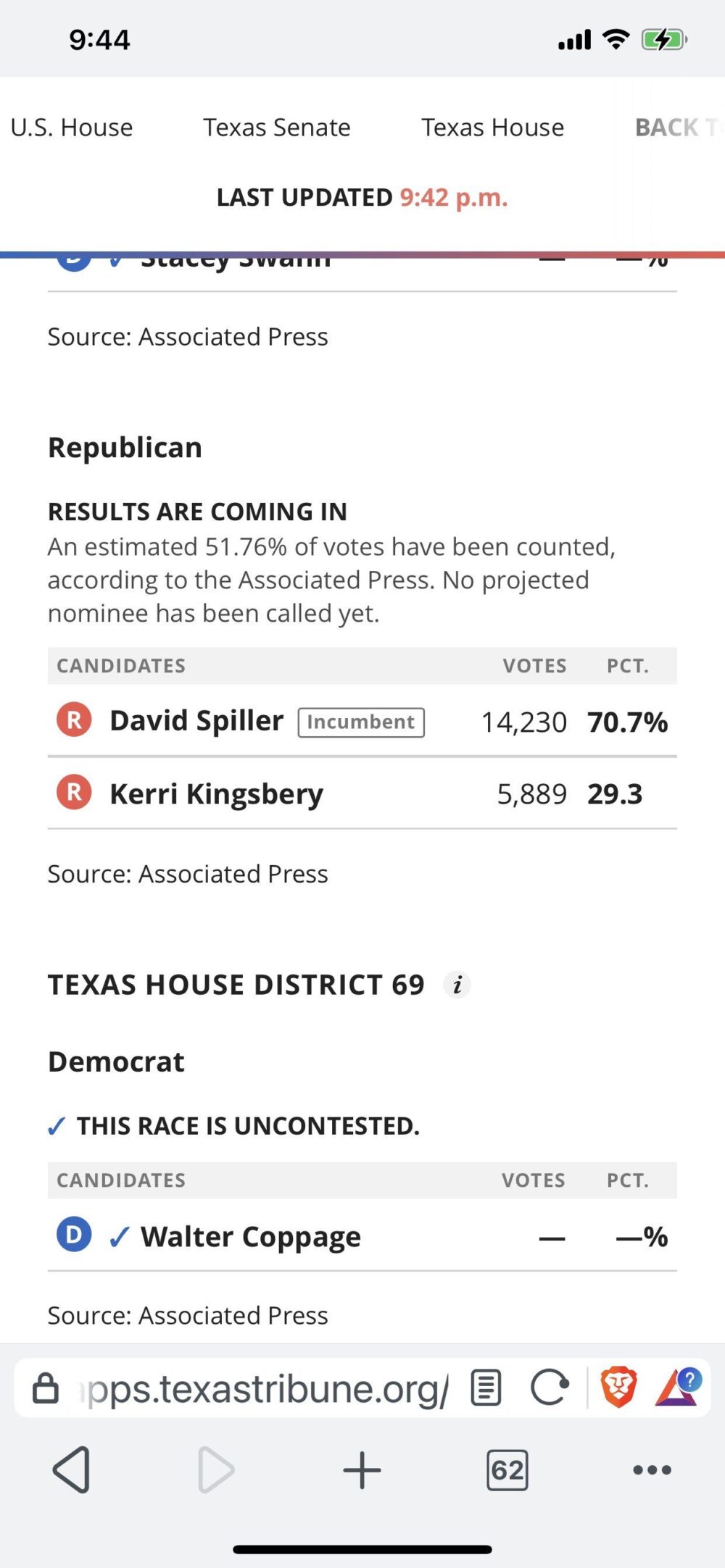The Dallas Express is investigating the growing concern that Texas elections allegedly can and have been stolen.
Barbara Isaacs, a Texas First team lead, recently visited with DX to discuss issues impacting election integrity. Texas First is a formidable statewide team comprising cyber experts, lawyers, precinct chairs, election judges, and other concerned citizens dedicated to safeguarding the integrity of our elections.
Texas First’s collective efforts aim to ensure accuracy, transparency, and accountability in the election process. Isaacs, a prominent member of this team, emphasized that their work is driven by a commitment to promoting fair and just electoral processes that truly reflect the will of the people, irrespective of their political affiliations.
Isaacs connected DX with Republican Kerri Kingsbery, a candidate in the 2024 primary election for House District 68, and Democrat Clint Curtis, a cybersecurity expert, for an exclusive interview about the troubling prospect of corrupted elections.
Curtis was a programmer who worked for notable organizations such as NASA, ExxonMobil, the U.S. Department of Transportation, and the U.S. Department of Defense.
Curtis testified in Congress in 2004 as the “programmer who actually wrote the prototype for the electronic voting machines.”
“In that prototype, the request was to make it so the election could be switched,” Curtis suggested to DX, noting that he could flip an election with just 24 lines of code.
“I testified before Congress, took a polygraph — the whole nine yards — and 20 years later, nothing has been done. In fact, it is worse now,” he said.
Kingsbery lost to incumbent Rep. David Spiller in the March 5 primary for HD 68. At 9:16 p.m. on March 5, Kingsbery explained, the reported counts on news stations and the internet showed her as being ahead by a large margin. But at 9:42 p.m., she said, the percentages of the vote attributed to each candidate seemingly switched with each other.
“Not only had it flipped, but my [new] vote count went down,” Kingsbery told DX. “I understand that results change – they are supposed to change – but the vote count on both sides should be going up. One side cannot all of a sudden go down. That’s not supposed to happen.”
Below are screenshots provided to DX illustrating the vote’s progression on The Texas Tribune’s election results page.
Election results: How Texas voted in the 2024 primary | The Texas Tribune
Curtis explained that some of the races that have allegedly been manipulated are not races that “anyone needed to cheat in” as the favored candidate was going to win with the people’s vote.
“Yet, you see this manipulation going on almost for fun or testing something,” said Curtis, citing the 2022 Texas 23rd Congressional District election in which Republican Tony Gonzales defeated Democrat John Lira and Independent Frank Lopez.
Curtis explained that during that race, at 8:23 p.m. on November 8, 2022, the “Democrat and the Independent had exactly the same number of votes at exactly the same time in eight different counties — and later, everything switched [to seemingly progressing as normal, with the percentage of votes for the Democrat and Independent candidates diverging from each other].”
“We actually caught it right before the flip, where everything was coming out equal. So, if you are a programmer, you go, ‘Hm, this is interesting.’”
DX was provided photos taken of the live online counts for each of the counties affected by the equalization Curtis mentioned that occurred at 8:23 p.m. The timestamp can be seen in the bottom right-hand corner. Three such screenshots are below:
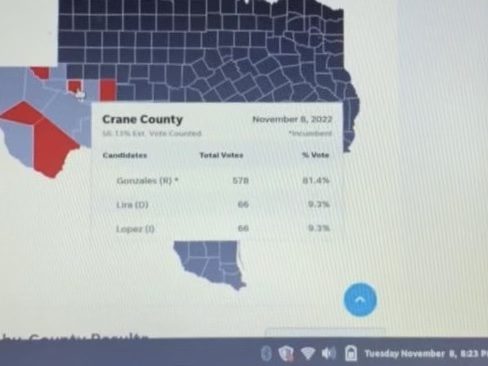
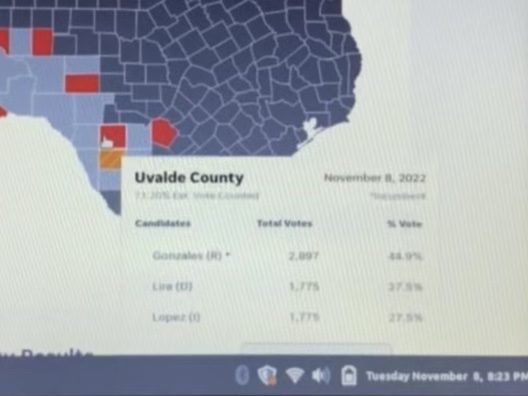
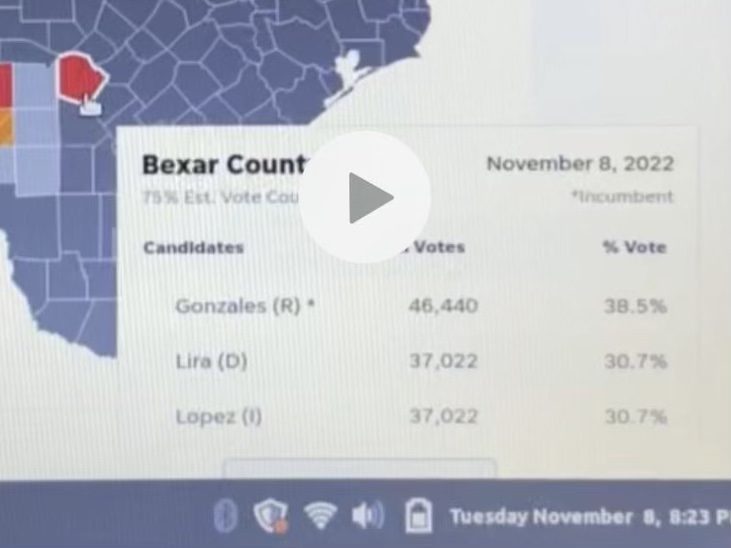
2022 Texas Election Results | Milwaukee Journal Sentinel
Explaining that this alteration of outcomes is not specific to any one voting machine seller or manufacturer, Curtis noted, “Anyone who thinks it’s vendor-specific is indescribably wrong.”
Curtis stated that “the machines can be hacked, and if you’re going to hack them, it does not [matter] where it is or [if] the vendor cooperates with you to make the hack happen.”
“Texas has the worst possible system,” said Curtis. He explained that after Texans cast their vote using a machine, their selections are printed onto a paper slip along with a barcode at the top. This slip is then hand-fed into another machine that acts as a ballot scanner and receptacle.
While the paper slip allows voters to ‘verify’ their selections, Curtis explained that the barcode is actually what transmits the vote data to the second machine: Voters’ selections are encoded into the barcode. When the paper ballot is fed into the second machine, it does not read the entire slip; it only scans the barcode.
Curtis also suggested that it’s suspicious that the barcode supposedly contains the same information as what’s printed on the slip below it, “yet they double encrypt it — this makes no sense. [The scanner] doesn’t read what’s below; it only reads the barcode. So, you have no idea what you’re feeding in. It can feed in anything it wants to at any part of the process along the way.”
He further noted that “many counties now have contracts with DHS that allow them to come into their electronic systems and change anything they need to change — anything. And that is in the contract. This is based on the fact that then, DHS will provide security for free.”
Curtis summarized these agreements as DHS effectively saying, “’I will secure your elections, but I get to do anything I want with them.’”
He stressed that those who wish to control an election can, adding, “Their interest is vested — it’s not in accuracy, and it’s not in trust. It’s, ‘We control the elections; you get to shut up, sit down, and we will tell you who won.’ And it is getting worse now — you can go to jail for calling out elections.”
Kingsbery echoed this sentiment:
“Nobody’s allowed to say anything about the elections, and you have no credibility if you do. Nobody wants to hear it.”
In her race, Kingsbery specifically asked the Secretary of State Elections Department “for the information to show the documentation of what was reported, how it was reported, and when it was reported,” but was allegedly told that they “cannot give that to her.”
Curtis added that if truly nothing nefarious is happening in elections, then “they should allow someone to verify that this is not being done. They give us nothing.”
Kingsbery, emphasizing that such reticence is incriminating in and of itself, challenged, “If nothing untoward happened, then provide the information.”
She further added that the day after the election, the Republican Party Chair in Brown County, Robert Porter, “went on the radio and boasted that the Secretary of State’s Office called him the night before, wanting to know what happened to those 9,000 votes.”
“None of it makes any sense,” said Kingsbery. “And nobody cares — if you make a big deal out of it, then it is just sour grapes.”
Curtis agreed.
“Winning is all that matters [to those willing to manipulate elections]. It doesn’t matter how,” he said. He commented that even elected officials who might believe there is a serious problem are likely hesitant to say or do anything as “they will be next on the chopping block.”
When DX asked Curtis how these machines — and elections — could even be hacked, he replied, “There are a thousand different tricks,” saying hacks can occur within hardware, software, and communication protocols.
He pointed to a 2015 evaluation Amazon had performed on a then-potential acquisition — a Chinese company called Elemental Technologies. The probe discovered a tiny malicious microchip, hardly bigger than a grain of rice, on the company’s motherboards that was not part of its original design. Numerous companies, including Department of Defense data centers and the CIA’s drone operations, used Elemental servers, as reported by Bloomberg.
Curtis explained that “testing the machines is all but worthless,” noting that “you can only test the machine the way that the vendor allows you to test. They set the rules.” This topic was recently reported by DX, revealing that the machines being tested in Collin County were in “test” mode, which is different from “election” mode.
When DX asked how election integrity issues could be fixed, Curtis said, “We have to go back to something that people can see with their own eyes and can trust.”
Kingsbery underscored the need for tangible verifiability to rebuild confidence in elections.
“We need to feel that whatever the results are, they are legitimate, and we are not there right now,” saying she would like to see the return of paper ballots.
“Trust is the important feature,” said Curtis. “Unless we get trust back into our elections, there really isn’t an election — there is nothing.”



